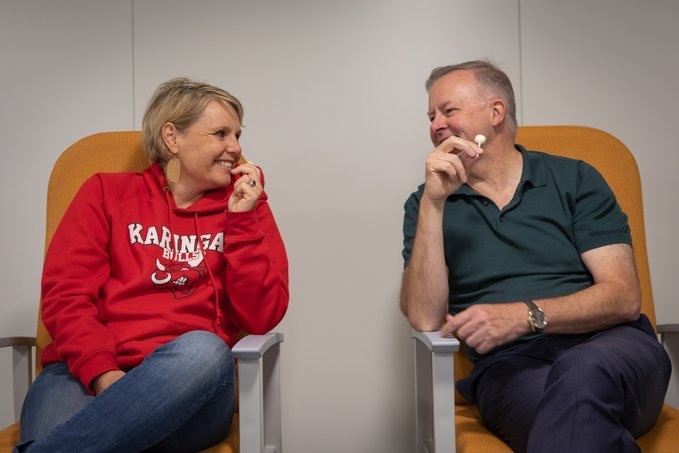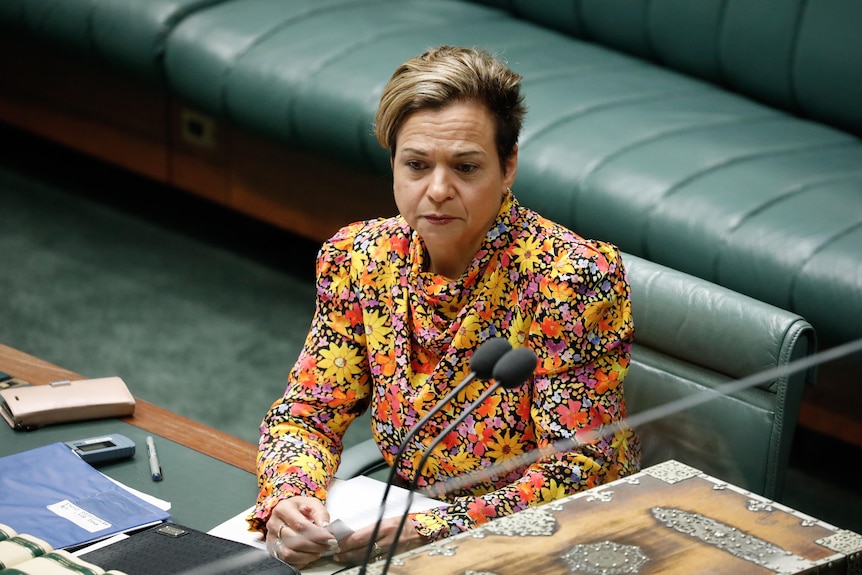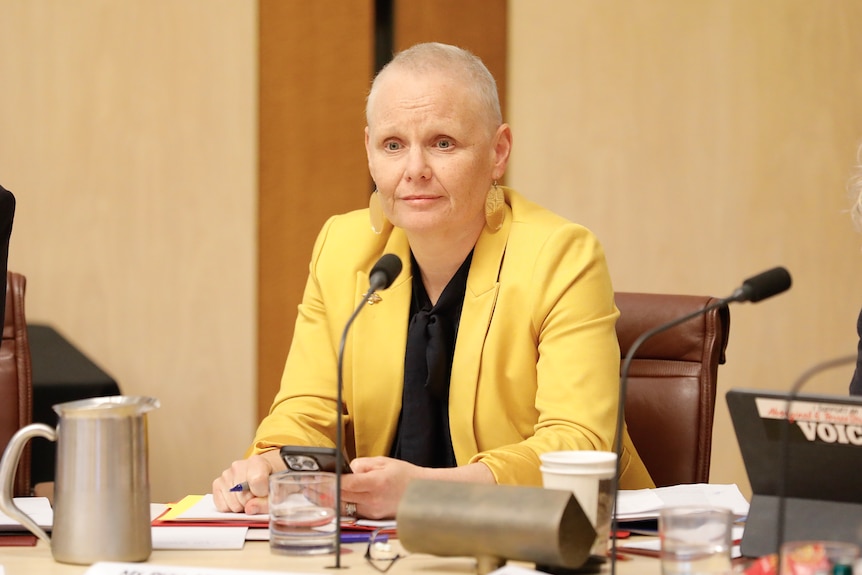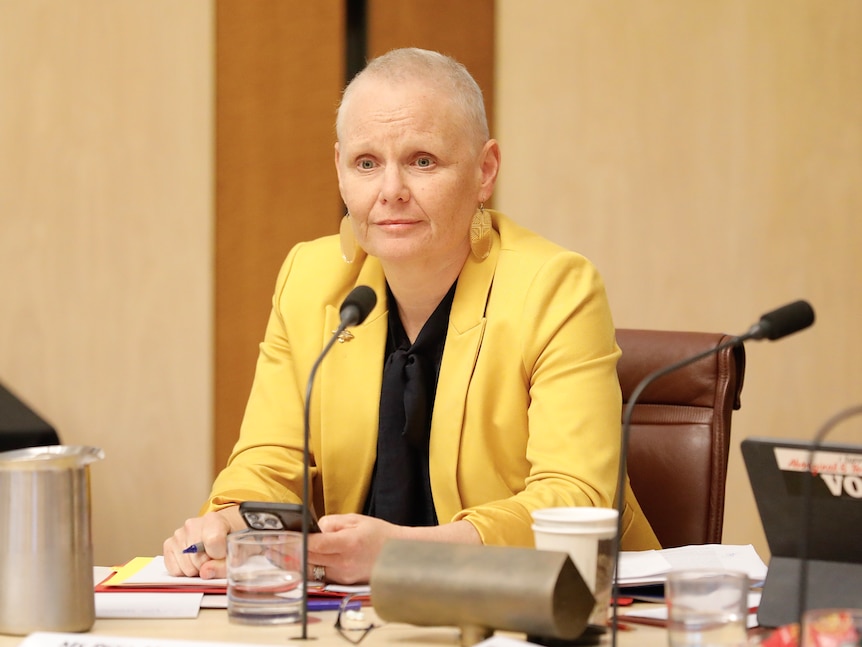There was a very uncomfortable elephant in the room when Labor MPs and senators met behind closed doors in Canberra on Tuesday morning.
Facing accusations the party wasn’t honouring the legacy of the late Peta Murphy by kowtowing to gambling and media companies, the politicians packed into their partyroom as Prime Minister Anthony Albanese sought to rally his troops after parliament’s winter break.
Albanese hailed the pay rise his government was delivering for early childhood workers and took aim at CFMEU officials, who he accused of “undermining the legitimate role of the trade union movement”.
Reports of the meeting suggest not a word was uttered about Labor’s plans to tackle online gambling advertisements.
With the PM not raising the issue, politicians who have been privately critical of their own government also opted for silence.
For Labor, it’s not just a public policy issue, it’s one that comes with much sharper feelings.

Peta Murphy’s time in the federal parliament was brief.
She packed more into her time in parliament than most do in a lifetime, before dying from cancer last year.
The cornerstone of her work was her time chairing a parliament committee that investigated online gambling. Bringing together politicians from across the political aisle Murphy achieved what others can only dream of — bipartisan consensus.
“Gambling advertising is grooming children and young people to gamble and encourages riskier behaviour,” the committee’s final report reads.
“The torrent of advertising is inescapable. It is manipulating an impressionable and vulnerable audience to gamble online.”
Not a single MP on the Labor-dominated committee dissented with the final report.
Online gambling compared to tobacco advertising
Murphy, a fierce competitor on the sporting field, didn’t pull a single punch as she took on media and gambling companies, who insisted the sky would fall in without gambling advertisements but refused to publicly release financial figures to support their claims.
“The strategies and language used by those with an interest in gambling advertising revenue to argue against further restrictions are nearly identical to what sports and broadcasters used in their campaigns against tobacco advertising reforms,” the committee report states.
“It is a shame that harmful industries appear to gain so much leverage over sports and media organisations.”
For Murphy, this wasn’t an issue about the modern media landscape, it was a matter of public health.
Spanning 169 pages, the committee made 31 recommendations. Among them was a four-phase approach to banning gambling advertisements over three years to allow broadcasters and sporting codes to find replacement revenue streams.
Besides the commercials broadcast on TV, the committee feared teenagers being exposed to high volumes of ads flooding social media and video sharing platforms.
Those on the committee and those who watched it up close insist it was the best of the parliament in action. And yet more than year on from its final report, there are few signs the government will adopt Murphy’s law.

Communications Minister Michelle Rowland is overseeing Labor’s response to the committee’s report.
Crossbenchers last year called for her to quit or be sacked after reports she accepted donations from gambling giant Sportsbet before the last election. While insisting no rules had been broken, Rowland confirmed she would no longer accept donations from the company.
Later in the year, the Australian Financial Review revealed gambling executives hosted the minister at a lavish lunch on her birthday.
The details of what the government is expected to announce remain closely held, with representatives briefed on the policy required to sign non-disclosure agreements. Anti-gambling advocates have dubbed that as an effort to silence dissent.
The scant details that have emerged suggest the government is pushing ahead with partial bans on gambling advertisement.
Ad limits rather than total ban
Labor backbenchers have told the ABC the proposal would set a limit of two gambling ads per hour on each channel until 10pm, and ban gambling advertising during children’s programs or in the hour before or after a live sport event.
Albanese told the parliament on Monday that the government was worried about “unintended consequences” like regional TV broadcasters (regional community radio stations would have been exempt under Murphy’s committee’s recommendations).
Media companies argue they are already taxed and regulated up the wazoo and the banning of gambling ads would be devastating to funding community sports, a sentiment backed by the AFL and NRL.
The anti-gambling advocate Tim Costello has argued the government doesn’t want to pick a fight with media companies with an election in sight. Others point to the $50 million regional media bailout package the former government announced during the pandemic as ways that the government could support Win News and Prime.
Free TV, which represents the commercial TV channels, told the ABC’s Afternoon Briefing that while tobacco is deadly, gambling isn’t. It’s a claim rejected by Federation University researcher associate professor Angela Rintoul, who told the ABC that the harm from gambling “accelerates family violence and is a risk factor for suicide”.
“Families and kids in regional areas should not pay penalty for propping up the outdated business model of our broadcasters,” she said.
“If the broadcasters are in dire straits this is a different issue that requires a different set of policy responses. Linking this to continued gambling advertising is lazy, at best. “
Loading…
Labor facing accusations it lacks courage
Within Labor party, there are divides. Some argue it would be a betrayal of Murphy, a universally adored figure, to fall short of what she called. Others says Labor’s proposal, if passed, could make a profound impact on tackling online gambling’s harm.
Albanese, speaking in the parliament on Monday, took aim at his Coalition predecessor John Howard, who joined with prominent Australians in calling for a complete ban, insisting the former Liberal leader “did absolutely nothing about any of these issues”.
When Howard left office, Facebook was barely three years old and the first iPhone and just been unveiled.
Peta Murphy’s widower Rod Glover, himself a long-time friend of Albanese, told the Nine newspapers that his late wife wouldn’t have copped that it was too hard to implement a total ban.

Crossbench MPs and senators have been more scathing, accusing Labor of caving to big business.
“I thought Labor on gambling was summed up by reports this morning that a Labor backbencher, on the condition of anonymity said that ‘sometimes you have to be brave’,” independent senator David Pocock told RN Breakfast on Tuesday.
“Just think about that. You’re anonymously saying that you need to be brave.”
Bravery was something Murphy had in spades as she fought her cancer.
In her final days she continued to argue that there was no half-way house, insisting partial bans don’t work.
Her final political act was convincing those who sat opposite her in parliament of the need to tackle online gambling. But it’s a message that looks to have fallen short with those who sat much closer on the government’s frontbench.
